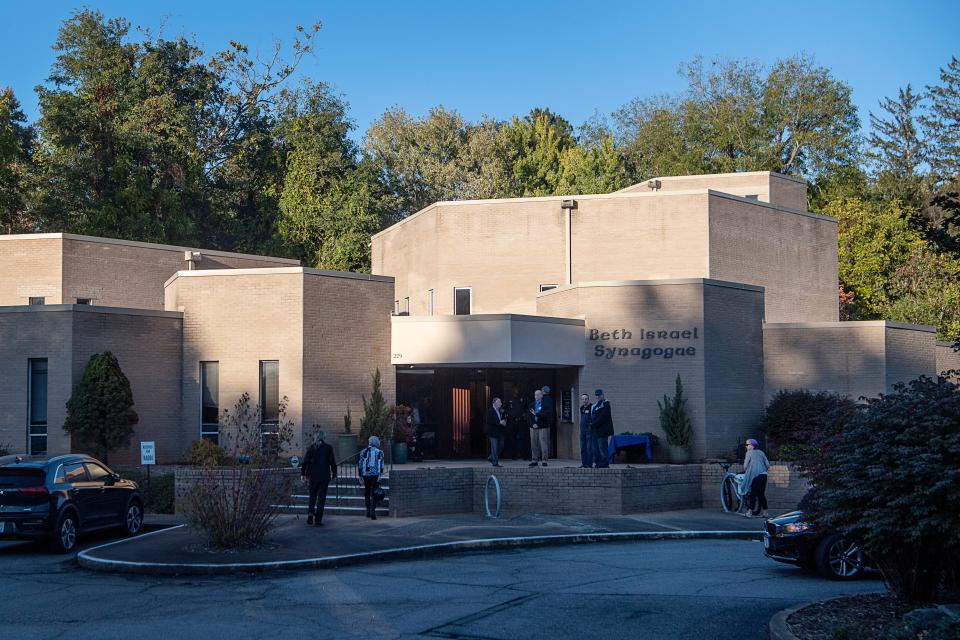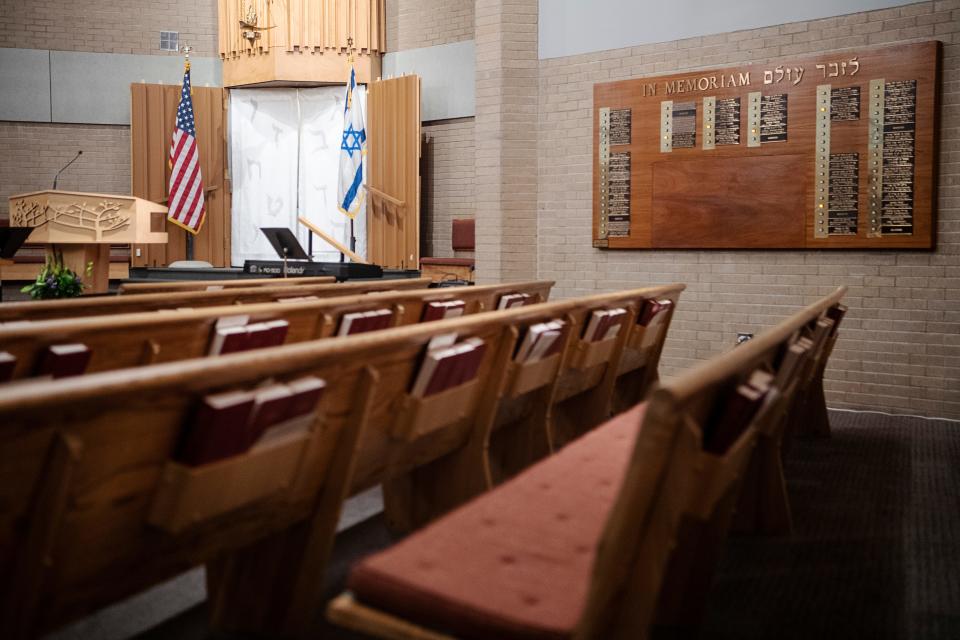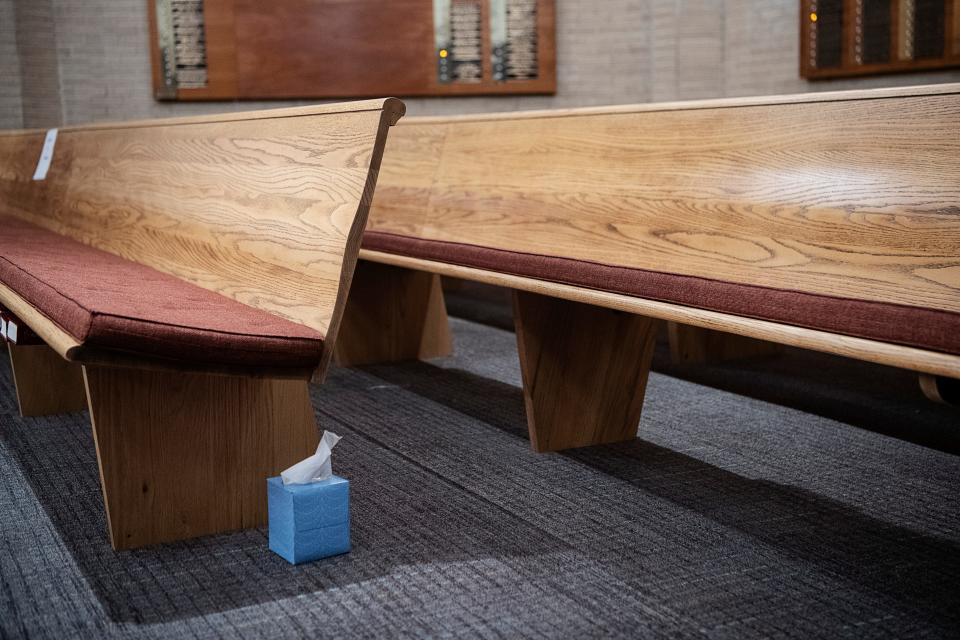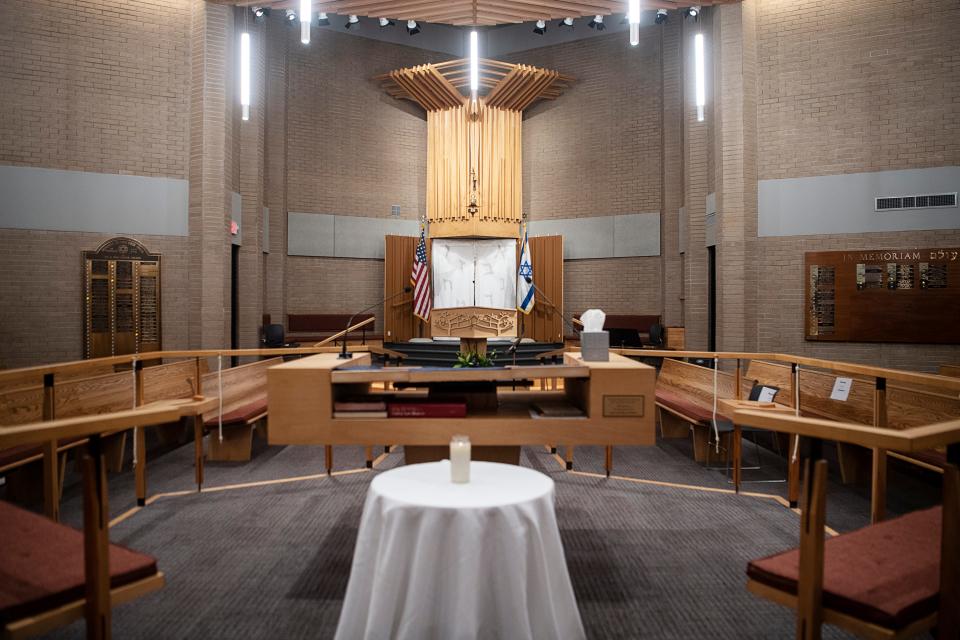Asheville's Jewish community gathers amid Israel-Hamas war, local threats
ASHEVILLE – Miri Massachi stood at the central bema of Asheville’s Congregation Beth Israel the evening of Oct. 12, speaking to hundreds gathered in grief and to support of one another. Massachi, who moved to Asheville from Israel in 2009, had two stories from her war-torn homeland to bring her community. One story was completely heartbreaking, the other showed how Israelis have found each other amid strife.
Massachi spoke about a friend she has in Israel who couldn’t locate their daughter. Her friend soon learned that her daughter was dead. The funeral was Oct. 12, the same day Massachi spoke.
She also relayed a story she read about a young woman who was killed at a dance party on the Gaza Strip during a Hamas attack. The young woman's mother put out a notice, hoping that 10 people would show up to her daughter’s funeral, the minimum attendance for a gathering according to the Jewish faith. Instead of 10 people, 10,000 attended the funeral.

War broke out in Israel Oct. 7 after Hamas — a Palestinian political group declared a terrorist organization by the U.S. State Department — launched a surprise assault on towns in the southern part of the country. The Israeli government responded quickly, launching their own offensives in Gaza and calling hundreds of thousands in reserves to fight. At least 2,300 people have died in the conflict, according to an Oct. 12 USA Today Report.

Massachi’s stories expressed what Asheville’s small Jewish population has endured since the conflict began. Many in the community are waiting on dispatches from friends and family escaping mortal danger. Some feel a profound sense of guilt for living in the idyllic Western North Carolina mountains, an ocean and a sea away, navigating life that seems to continue like normal.
Sitting in front of Massachi, in a sanctuary so packed that its doors were opened for overflow seating, Asheville’s Jewish community sought comfort and healing in their own shared experience the night of Oct. 12 in the North Asheville temple, under high security.
“It’s very hard to be far away, to hear all of this and feel like there’s not much you can do,” Massachi told the Citizen Times earlier in the week.
But for the Asheville congregants, gathering was an act itself.
“Our sacred intention was for us to draw close together as one people, a community shocked by grief and horror,” Rabbi Batsheva Meiri, who leads Congregation Beth HaTephila, the oldest synagogue in Asheville, told the gathering. “To provide each and every member of this single Jewish family the well-needed support and comfort they might need at this time. To make sure no one grieved alone. Processed alone. Cried alone.”

Many cried Thursday evening at the North Asheville congregation, but no one cried alone. Some mentioned people they knew who were killed or called into battle.
The Citizen Times was invited inside the synagogue but was asked not to take any photos during the event.
It was an Asheville crowd. People with tattooed arms, some wearing athleisure. Mayor Esther Manheimer attended and spoke briefly.
"We are so fortunate to have a well-organized and caring Jewish community, ready to drop everything to come together as a community and embrace one and other," she said.
Asheville Police Department officers stood at the door, a reminder to the congregants of the carnage that has met Jewish gatherings in the United States in the recent past, including the massacre at the Pittsburgh Tree of Life synagogue in 2018, where a man killed 11 congregants in the deadliest antisemitic attack in American history. Antisemitism was alive closer to home earlier that day ― an Asheville man was arrested after sending hateful emails to a local synagogue.

“Trauma is not just an echo from the past. This is what is happening today,” Meiri told the Citizen Times.
Rabbi Shaya Susskind, who leads Chabad Lubavitch in Asheville, told the congregation that even if they cannot fight with the Israeli army, they can still serve.
“(There are) many divisions to be a part of, and every division matters,” Susskind said. “The prayer division, the accurate reporting division, the extra acts of kindness division.”
Toward the end of the evening, before Asheville’s Jewish community dispersed back to their homes, they sang, forming a gentle echo between the leader of the congregation and those following just behind.
The song ended: “Heal us now, heal us now, heal us now.”
Mitchell Black covers Buncombe County and health care for the Citizen Times. Email him at [email protected] or follow him on Twitter @MitchABlack. Please help support local journalism with a subscription to the Citizen Times.
This article originally appeared on Asheville Citizen Times: Asheville's Jewish community gathers in support of Israel
